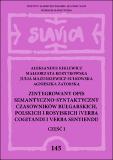Zintegrowany opis semantyczno-syntaktyczny czasowników bułgarskich, polskich i rosyjskich (verba cogitandi i verba sentiendi). Cz. 1
An integrated semantic and syntactic description of Bulgarian, Polish and Russian verbs: Verba cogitandi and verba sentiendi. Part 1
Author(s): Aleksander Kiklewicz, Małgorzata Korytkowska, Julia Mazurkiewicz-Sułkowska, Agnieszka Zatorska
Subject(s): Language and Literature Studies, Theoretical Linguistics, Syntax, Semantics
ISSN: 0208-4058
Published by: Instytut Slawistyki Polskiej Akademii Nauk
Keywords: semantics; syntax; predicate-argumentate structures; transformations of syntactic structures; Bulgarian language; Polish language; Russian language
Summary/Abstract: “Zintegrowany opis semantyczno-syntaktyczny czasowników bułgarskich, polskich i rosyjskich (verba cogitandi i verba sentiendi)” (An integrated semantic and syntactic description of Bulgarian, Polish and Russian verbs: Verba cogitandi and verba sentiendi) includes an extensive monographic study of two classes of Bulgarian, Polish and Russian verbs: verbs of thinking (verba cogitandi) and verbs of feeling (verba sentiendi), as well as two dictionaries featuring their semantic and syntactic descriptions. The study aims to investigate relations between the syntactic and semantic layer, which are greatly determined by features of the verbs that build sentence structures. The authors analyse semantic-syntactic processes in sentence structures identified in the study material – most of which involve condensation – and formal manifestations of basic sentence categories that have an impact on the features of syntactic structures. The study also involves important lexicographic questions, concerning not only the form and content of dictionary entries but also their delimitation, that is, drawing a line beyond which items under consideration display different features and thus should make up separate entries. Since the volume concerns three Slavic languages, it also includes some observations and conclusions on their contrastive features.
Series: Prace Slawistyczne. Slavica
- E-ISBN-13: 978-83-66369-03-0
- Page Count: 398
- Publication Year: 2019
- Language: Bulgarian, Russian, Polish

